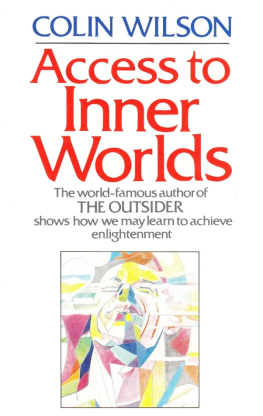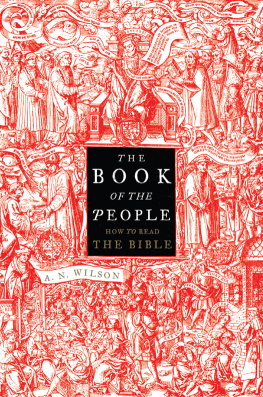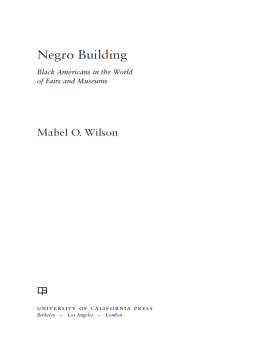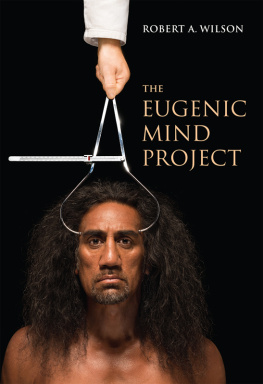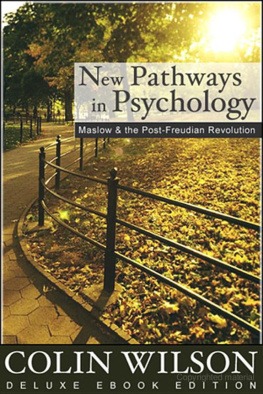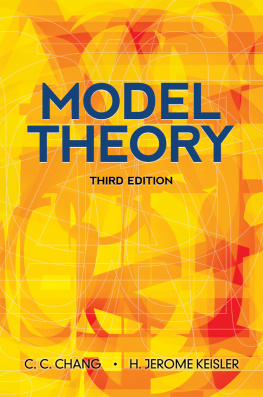Wilson - Access to inner worlds : the story of Brad Absetz
Here you can read online Wilson - Access to inner worlds : the story of Brad Absetz full text of the book (entire story) in english for free. Download pdf and epub, get meaning, cover and reviews about this ebook. City: London, year: 1983, publisher: Rider & Co, genre: Science fiction. Description of the work, (preface) as well as reviews are available. Best literature library LitArk.com created for fans of good reading and offers a wide selection of genres:
Romance novel
Science fiction
Adventure
Detective
Science
History
Home and family
Prose
Art
Politics
Computer
Non-fiction
Religion
Business
Children
Humor
Choose a favorite category and find really read worthwhile books. Enjoy immersion in the world of imagination, feel the emotions of the characters or learn something new for yourself, make an fascinating discovery.
- Book:Access to inner worlds : the story of Brad Absetz
- Author:
- Publisher:Rider & Co
- Genre:
- Year:1983
- City:London
- Rating:3 / 5
- Favourites:Add to favourites
- Your mark:
- 60
- 1
- 2
- 3
- 4
- 5
Access to inner worlds : the story of Brad Absetz: summary, description and annotation
We offer to read an annotation, description, summary or preface (depends on what the author of the book "Access to inner worlds : the story of Brad Absetz" wrote himself). If you haven't found the necessary information about the book — write in the comments, we will try to find it.
Access to inner worlds : the story of Brad Absetz — read online for free the complete book (whole text) full work
Below is the text of the book, divided by pages. System saving the place of the last page read, allows you to conveniently read the book "Access to inner worlds : the story of Brad Absetz" online for free, without having to search again every time where you left off. Put a bookmark, and you can go to the page where you finished reading at any time.
Font size:
Interval:
Bookmark:
Selected works by the same author:
On the afternoon of Sunday 3 January 1960, I was about to leave the house when the telephone rang. A man with a strong foreign accent explained to me that he was from some international press agency, and that he was ringing to tell me that Albert Camus had been killed in a car accident. For a moment I suspected a joke; my friend Bill Hopkins often rang me up pretending to be a Chinese laundry, or the head of the womens section of the KGB with just one vacancy for a male. The journalist soon convinced me that he was genuine; he knew too much about the accident to be making it up. Camus had been driving back to Paris with his friend Michel Gallimard when a front tyre burst. The car hit a tree and Camus was catapulted through the rear window; he was killed instantly.
On my way to the station a few minutes laterI was going to meet my wifeI tried to grasp the fact that Camus was dead. He worked for Gallimard, my French publisher, and had been about to write an introduction to my second book. I had met him in Paris and found him immensely likeable. Yet now, trying to focus the meaning of his death, I found myself unable to summon any reaction. It was like ringing a doorbell and hearing no sound. When I asked myself: How do you feel about his death?, the answer was a kind of: So what?
Yet, in a sense, this was appropriate. The starting-point of all Camuss work is this sense of meaningless, that feeling of alienation that he called the absurd. Meursault, the hero of LEtranger, experiences this same inability to react to the death of his mother. Mother died today. Or maybe yesterday; I cant be sure ... He is not heartless or self-centred, merely trapped in the present. It would not even be true to say he is bored, he seems reasonably contented. But his sense of meaning is limited to what goes on at the end of his nose.
Then, at the end of the bookwhen he has been sentenced to death for killing an Arabhe experiences a surge of anger that brings insight. It was as if that great rush of anger had washed me clean, emptied me of hope, and...I laid my heart open to the benign indifference of the universe. Staring at the stars he comments: To feel it so like myself...made me realize that Id been happy, and that I was happy still. This seems an odd statement from a man who seems to plod through life like a blinkered horse. Is it possible to be happy without knowing it?
Here we confront a paradox; for the answer is yes. We have all experienced the moments that William James calls melting moods, when it suddenly becomes perfectly obvious that life is infinitely fascinating. And the insight seems to apply retrospectively. Periods of my life that seemed confusing and dull at the time now seem complex and rather charming. It is almost as if some other persona more powerful and mature individualhas taken over my brain. This higher self views my problems and anxieties with kindly detachment, but entirely without pity. Looking at problems through his eyes, I can see I was a fool to worry about them.
If I could remain in this state all the timeor at least, summon it at willlife would be a continual adventure. And this is the maddening absurdity. For during these moments of intensity and affirmation, we can see that it would be so easy to maintain this insight. Whenever we face crisis or difficulty, we can see that life without it would be delightful. Raskolnikov in Crime and Punishment says that he would rather stand on a narrow ledge for ever than die at once. But we do not have to go that far to see that life without crisis or misery is full of potentiality. I can recognize this truth even when a minor inconvenience disappears. If the lavatory is out of order for a week, I heave a sigh of relief when the plumber finally appears. The fact that I can now stop flushing it down with buckets of water becomes an extension of my freedom, a source of active pleasure. And it continues to be so until I begin taking it for granted. When this happens, I slip into the state in which Meursault spends most of his life: happy without realizing it.
What is wrong with human beings? Why is it, as Fichte says, that to be free is nothing; to become free is heavenly? Why is it that we seem to be unable to appreciate our freedom unless it is under threat? Why do human beings seem to live in an almost permanent state of unreality?
The basic answer is that human beings are the only creatures who spend 99 per cent of their time living inside their own heads. Sherlock Holmes used to keep a cabinet filled with press cuttings on every subject under the sun, so that if he was confronted with a mystery involving, let us say, an American oil millionaire, he could send Watson to the file for a sketch of the mans career. We all have similar filing cabinets inside our own heads, and they contain press cuttings (some of them rather brittle and faded) of everything that has ever happened to us. Confronted by some irritating problem, we can look in the file to see whether anything like it has ever happened in the past. This means that we can brood on these matters while lying in bed with our eyes closed; the experience is all there in the filing cabinet.
But this method has its disadvantages. When I am dealing with the real world, I react to it in a sensible and balanced manner, and find many problems exhilarating. When I am lying in bed with my eyes closed, I am out of touch with reality; the result is that I am likely to over-react to problems, and work myself into a state of anger or frustration or depression. And even when I am supposed to be in touch with reality during the day, I spend a great deal of my time in that library with its filing cabinets. Every time I stare out of a window, or wait at a bus stop, or sit in the midst of a traffic jam, I descend into my mental world, and virtually lose touch with reality.
This ability to live inside our heads is, of course, one of the greatest evolutionary advances made by the human race. Grey Walter remarks in his book on the brain that a chimpanzee cannot maintain a mental image long enough to reflect on it.
Human beings can not only maintain mental images; they can spend hours at a time in a world of imagination. The purpose of this faculty is to enable us to envisage the future and anticipate its problems. Yet it has one enormous disadvantage, it means that we can, without even noticing it, lose contact with the world of actuality. There is an old joke of a man going to borrow a lawn-mower from his next door neighbour. On the way there, he imagines his neighbour saying: Why dont you buy one of your own?, to which he replies: Because I cant afford it. Then why not get one on hire purchase? I dont like being in debt. Yet youre willing to come and borrow mine... At this point he meets his neighbour in the front garden and shouts: Keep your bloody lawn-mower... We all allow similar fantasies to undermine the sense of reality. And we are totally unaware of how far the fantasy has taken on a life of its own. Man is the only animal who is prone to insanity; and this is because he spends so much time in this suffocating prison inside his own head. His fantasies creep all over him, like ivy on a tree, until they drain away his life.
This is why the moments of realitylike Meursaults sense of relief and happinesscome as such a shock. Our mental apparatus reduces things to oversimplified images, and we come to accept these as a fair copy of the reality out there. And then, in some moment of relaxation and happiness, the reality bursts through, infinitely more exciting than our dehydrated mental images. It is more real, heavier, richer, more beautiful, and it fills us with a desire to live for ever. Camus describes such a moment at the end of his story The Woman Taken in Adultery. Her adultery is with the African night, which enters into her being and possesses her. Not a breath, not a sound, except at intervals the muffled crackling of stones that the cold was reducing to sand...After a moment, however, it seemed to her that the sky above her was moving in a sort of slow gyration. In the vast reaches of the dry, cold night, thousands of stars were constantly appearing, and their sparkling icicles, loosened at once, begin to slip gradually towards the horizon. Janine could not tear herself away from contemplating these drifting flares. She was turning with them...The passage brings to mind another woman taken in adulteryLawrences Lady Chatterleyand her own mystical sense of living nature as she returns home after love-making: in the twilight the world seemed a dream; the trees in the park seemed bulging and surging at anchor on a tide, and the heave of the slope to the house was alive. And Dostoevskys Alyosha experiences a similar sensation as he looks at the stars: there seemed to be threads from all those innumerable worlds of God, linking his soul to them; he flings himself, weeping, on his knees, to kiss the earth.
Next pageFont size:
Interval:
Bookmark:
Similar books «Access to inner worlds : the story of Brad Absetz»
Look at similar books to Access to inner worlds : the story of Brad Absetz. We have selected literature similar in name and meaning in the hope of providing readers with more options to find new, interesting, not yet read works.
Discussion, reviews of the book Access to inner worlds : the story of Brad Absetz and just readers' own opinions. Leave your comments, write what you think about the work, its meaning or the main characters. Specify what exactly you liked and what you didn't like, and why you think so.

